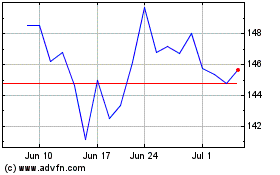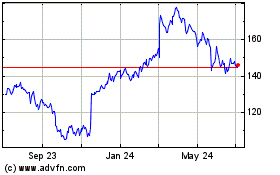Today's Top Supply Chain and Logistics News From WSJ
August 17 2017 - 7:07AM
Dow Jones News
By Paul Page
Sign up: With one click, get this newsletter delivered to your
inbox.
The Trump administration is making clear that simple tweaks
won't be enough to complete a renegotiation of the North American
Free Trade Agreement. U.S. trade representative Robert Lighthizer
opened new talks between the U.S. Canada and Mexico by setting
ambitious goals, the WSJ's William Mauldin and Paul Vieira report,
suggesting a long and difficult road ahead for rewriting the
23-year-old accord. The U.S. is focused on trade imbalances, and
says it wants to boost rules that protect intellectual property,
guard against currency manipulation and change dispute-resolution
mechanisms. One way Trump officials want to move the needle on
deficits by tightening the "rules of origin" that govern how goods
can qualify for tariff-free treatment. That's raising worries among
auto makers, who warn about risks to integrated supply chains if
new trade rules make it harder to ship parts across borders. The
U.S. hasn't put together a concrete proposal, however, because it
still must find common ground with lawmakers and business
groups.
A global cyberattack is slowing but not stopping Maersk Line's
growing financial strength in an improving shipping market. The
world's largest container shipping line posted a $339 million
profit in a second quarter that including expanding volumes and
rapidly rising prices, the WSJ's Costas Paris and Dominic Chopping
report. The gains came as Maersk's parent conglomerate A.P.
Moller-Maersk A/S swung to a surprise loss in the quarter, as it
wrote down the value of tanker and port assets. The ransomware
attack at the end of June will end up costing Maersk up to $300
million, a hit that included the equivalent of some 70,000 shipping
containers that were diverted to other carriers. But Maersk Chief
Executive Soren Skou said the spring was effectively a turning
point for a shipping business that now is "clearly out of the
financial crisis." Demand growth was nearly double the growth in
supply, and average freight rates rose 22%, trends that weren't
pushed aside by Maersk's hacking ordeal.
Target Corp. is ringing up more sales and doing it profitably as
the retailer's supply chain gets more efficient. The company added
to the run of good news from store owners with its report that
sales at stores open at least a year rose 1.3% in the second
quarter, the WSJ's Khadeeja Safdar reports, and that Target now
expects stronger profits this year on improving foot traffic and
lower-cost operations. The results, along with strong U.S. consumer
spending in July and robust shipping import figures, point to
gathering confidence in a sector struggling to adjust to changing
shopping patterns. Target has adjusted by reducing its inventory
more than 4% from a year ago and linking e-commerce fulfillment
more closely to stores. Digital sales jumped 32% from a year ago,
and Target says some 40% of its goods sold online were shipped from
stores. Target's aim is to "reduce unproductive inventory and speed
up our supply chain," and more customer sales can only help.
BULK SHIPPING
Zinc is getting more expensive on global metals markets, but
that won't help shipping companies much if miners don't start
producing more of the commodity. The price of zinc is at a 10-year
high, capping a steep climb in the base metal that the WSJ's David
Hodari reports follows supply cuts from mining companies. Glencore
PLC reduced its zinc mining by 500,000 tons a year nearly two years
ago, amounting to 4% of global production, one of the moves that
have roiled commodity markets. Glencore recently said it increased
zinc production by 13% from the same period last year, but the
company isn't going further by opening shuttered mines in Peru and
Australia, opting instead to keep a cap on supply. Zinc is the
lightweight, rustproof metal used in the car and construction
industries, and its rising costs can translate into higher auto and
steel prices. Demand remains strong in China, but investors and
analysts are betting that mining companies won't ramp up production
anytime soon, suggesting ship;ing volumes are unlikely to bulk
up.
QUOTABLE
IN OTHER NEWS
Two of President Donald Trump's councils of top business leaders
are disbanding, following controversial remarks Mr. Trump made.
(WSJ)
Norfolk Southern Corp. named Chief Information Officer Cynthia
Earhart as the freight railroad's next finance chief. (WSJ)
The unemployment rate in the U.K. fell to a 42-year low in June.
(WSJ)
Fiat Chrysler is joining a consortium led by BMW AG and Intel
Corp. to develop self-driving car technology. (WSJ)
Home Depot Inc. raised its outlook for the second time this
year, projecting a 13% jump in earnings. (WSJ)
Pharmaceutical and chemical giant Bayer AG will join Florida's
battered citrus industry in its decadelong fight against a disease
ravaging the state's groves. (WSJ)
U.S. semiconductor testing company Cohu Inc. is trying to derail
the sale of rival Xcerra Corp. to a Chinese state-backed group,
citing national security concerns. (WSJ)
U.S. business inventories rose 0.5% in June, the biggest
increase in seven months. (CNBC)
U.S. factory workers are quitting their jobs at the fastest pace
in a decade even as the White House stresses the need for
manufacturing jobs. (Washington Post)
China's government is backing a $3.3 billion aid package for
China Shipbuilding Industry Corp, the country's largest
shipbuilding conglomerate. (Lloyd's List)
Texas-based apparel maker Trybus Group is placing a factory in
Ethiopia, adding to the growing textile production in the African
nation. (Sourcing Journal)
The Baltic Dry Index measuring rates for carrying dry bulk
commodities is at its highest level in nearly four months.
(MarineLink)
Overall revenue at Port of Hamburg terminal operator HHLA rose
9% in the first half of 2017, boosted by 12% growth in container
throughput. (Port Technology)
Pacific International Lines and terminal operator PSA
International will work with IBM to test blockchain technology in
tracking goods. (Maritime Professional)
Amazon.com Inc. will put a distribution center in Bristol, U.K.,
that will employ 1,000 people. (The Independent)
Cathay Pacific Airways Ltd. lost $260 million in the first half
of the year despite a 13.3% gain in cargo revenue. (South China
Morning Post)
United Parcel Service Inc. will start using virtual reality
headsets to train delivery drivers. (ZDNet)
ABOUT US
Paul Page is deputy editor of WSJ Logistics Report. Follow him
at @PaulPage, and follow the entire WSJ Logistics Report team:
@brianjbaskin , @jensmithWSJ and @EEPhillips_WSJ. Follow the WSJ
Logistics Report on Twitter at @WSJLogistics.
Write to Paul Page at paul.page@wsj.com
(END) Dow Jones Newswires
August 17, 2017 06:52 ET (10:52 GMT)
Copyright (c) 2017 Dow Jones & Company, Inc.
Target (NYSE:TGT)
Historical Stock Chart
From Apr 2024 to May 2024

Target (NYSE:TGT)
Historical Stock Chart
From May 2023 to May 2024
